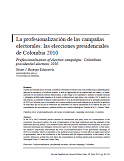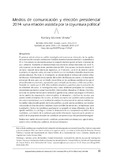Advancing democratic processes in Ecuador: A case study on neural network-driven OCR for election report verification

Compartir este ítem
Fecha
2024Autor
Asimbaya J.A.M
Ramírez G.M
Díaz-Arancibia J.
Citación
Metadatos
Mostrar el registro completo del ítemResumen
Background: In Ecuador, scepticism surrounding electoral outcomes underscores the need for a reliable system to ensure transparent election results. Manual verification demands a more efficient approach due to the vast volume of election reports. This research introduces an automated system leveraging Artificial Intelligence to process results from Ecuador's three recent national elections. Methods: The system, designed with a three-layer architecture, extracts, processes, analyses, classifies and compares election results. We thoroughly analysed the National Electoral Council of Ecuador (CNE) web pages for effective data extraction and processing. Rigorous unit and acceptance tests validated the system's functionality. A classifier model, trained using data augmentation techniques, achieved a 98% accuracy rate. Results: While the system boasts high efficiency, we identified three errors, accounting for less than 5% of the total fields processed. Notably, the quality of scanned reports and illegible handwritten numbers posed challenges for the classifier. Conclusions: The system's deployment by an authorized entity in Ecuador could enhance the CNE's information verification. Despite some errors, the system's potential is clear. Future work includes refining classifiers, verifying officer signatures, and expanding the system's scope, aiming for a more transparent electoral process. © 2024 John Wiley & Sons Ltd.
Colecciones
- Indexados Scopus [1813]
Ítems relacionados
Mostrando ítems relacionados por Título, Autor o Palabra clave.
-
La profesionalización de las campañas electorales: las elecciones presidenciales de Colombia 2010
Restrepo Echavarría, Néstor J. (Asociación Española de Ciencia Política y de la AdministraciónComunicación y Relaciones CorporativasFacultad de Comunicación, 2015)A partir de la década de los noventa, la política colombiana evidenció una crisis institucional y partidista generada por la corrupción, el conflicto armado, la falta de legitimidad de las instituciones del Estado y el ... -
Media and the 2014 presidential election: a relationship aided by the political situation
Montero Urrutia, NathalyThis article presents a research on the information structure of the media with the highest audience rating in Colombia during the 2014 presidential election in Colombia. This process is widely recognized because the ... -
Proposal of an indicator to measure the professionalization of election campaigns: The case of Colombia [Propuesta de un indicador para medir la profesionalización de las campañas electorales: El caso de Colombia]
Restrepo-Echavarría N.-J.; Rodríguez-Díaz R.; Castromil A.R. (El Profesional de la InformacionComunicación y Relaciones CorporativasFacultad de Comunicación, 2018)An indicator is proposed that measures the degree of professionalization of presidential campaigns in political systems where there is high personalization and low institutionalization of political parties. The professionalization ...


